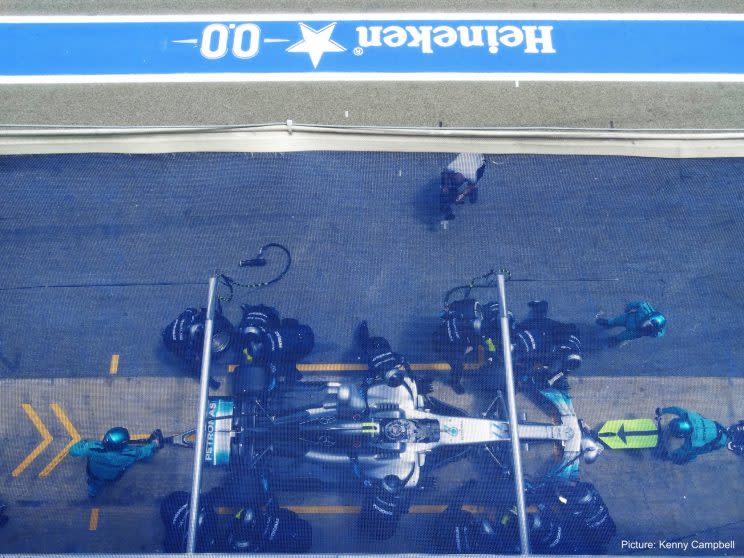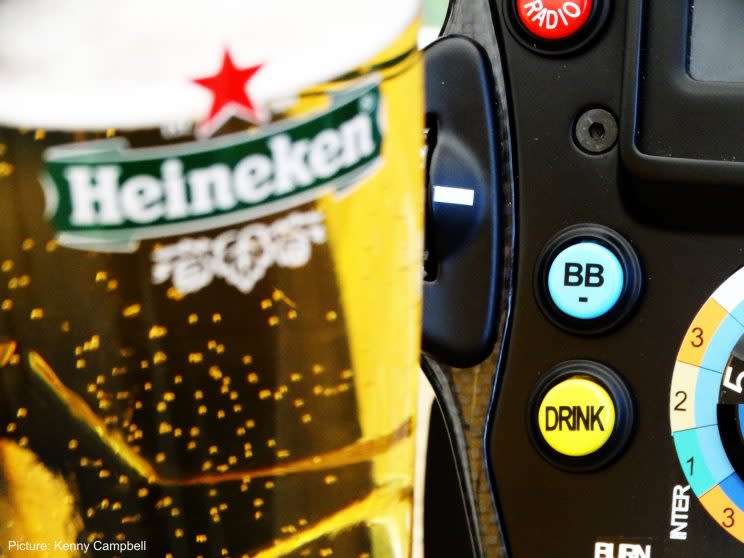Drinking and driving fast: Why Heineken has gone alcohol-free in F1

Formula 1 and alcohol have had a long and, often, iconic relationship.
From the liberal spraying of champagne on podiums to some of the most striking liveries in racing – Martini’s racing stripes spring immediately to mind – F1 is, literally at times, steeped in alcohol.
That, of course, hasn’t gone down well universally. When, in 2016, Dutch beer giant Heineken moved into F1 with a deal rumoured to be worth a cool quarter of a billion dollars over seven years, anti-alcohol pressure groups were quick to react.
FIA president Jean Todt was urged to ban alcohol sponsorship in F1 by campaigners from the European Alcohol Policy Alliance.
Of course, that hasn’t happened – well, not yet. Remember, though, how long the battle over tobacco sponsorship rumbled on.
And remember the tricks teams and sponsors played to keep tobacco front of mind – from Jordan’s ‘Buzzin Hornets’ logo (we all knew the B&H stood for Benson & Hedges) to Marlboro’s relatively subtle redesign of the Ferrari livery to incorporate subliminal Marlboro branding, even after tobacco advertising was banned.
Heck, Ferrari team principal Maurizio Arrivabene is a former Marlboro marketing boss.
Now, it looks like Heineken is already playing a defensive masterstroke in the tricky marketing game that links drinking and driving.

Around F1 circuits you’ll see plenty of booze being advertised – at Monaco, for example, Johnnie Walker is all over the place and Kingfisher Beer is a permanent fixture on the Force Indias. And Martini is ever-present, on the Williams cars and on hoardings everywhere.
But Heineken isn’t advertising beer. Well, not the beer that you grew up with.
The Dutch brewer is advertising its new ‘0.0’ alcohol-free beer.
It was launched at the Spanish Grand Prix – 10 per cent of beer sold in Spain is alcohol-free or low-alcohol; yes, you read that right – and it’s Heineken’s big play for the next year or two.
Now, beer markets have been shrinking and Heineken global brand director Gianluca Di Tondo told me his company was targeting the soft drinks market with ‘0.0’. Given the money that’s being sunk into the alcohol-free offering (it’s taking a huge chunk of Heineken marketing budgets), there’s no doubt the brewer is deadly serious about this stuff.
But, from an advertising perspective, alcohol-free beer brings all sorts of advantages.
Alcohol advertising gets banned? No worries, we’re not advertising alcohol.
And our alco-free logo looks rather like our regular logo, though it’s blue rather than green.
So you get the message. And that message is ‘buy Heineken’.

From F1’s perspective, this is good news. It’s an expensive sport and megabucks booze sponsorships of teams and tracks help keep the wheels well-oiled.
From an anti-alcohol perspective, it’s rather more tricky. Heineken’s new drink looks like regular beer and tastes like regular beer – brewmaster Willem van Waesberghe told me it’s made just the same way as regular beer then has the alcohol removed gradually (which, as an aside, makes it more expensive to produce).
READ MORE: Andy Murray confident of shaking off bug ahead of French Open
READ MORE: Rose – Harry Kane wants to stay at Spurs but we risk exodus
But, as a marketing tool, it’s an F1 dream. F1 and Heineken get to push their anti-drink-drive message as well as their ‘drink beer’ message.
Money pours into the sport, shareholders get a little richer and it’s an instant work-around for any problems that crop up around alcohol advertising.
And don’t for a minute think alcohol advertising as we know it is here forever – around the world, there are countless restrictions on how alcohol and sport can be linked.
For example, the forerunner to the European Champions Rugby Cup was known as the Heineken Cup – except in France where, because of advertising restrictions, it was called the H Cup.
You can see why Heineken is pushing ‘0.0’ – it’s not just because alcohol-free beer is likely to be a big part of the future, it’s also because alcohol-free advertising is likely to be a big part of the future.
Proost, as they say in the Netherlands.

 Yahoo Sport
Yahoo Sport 






































